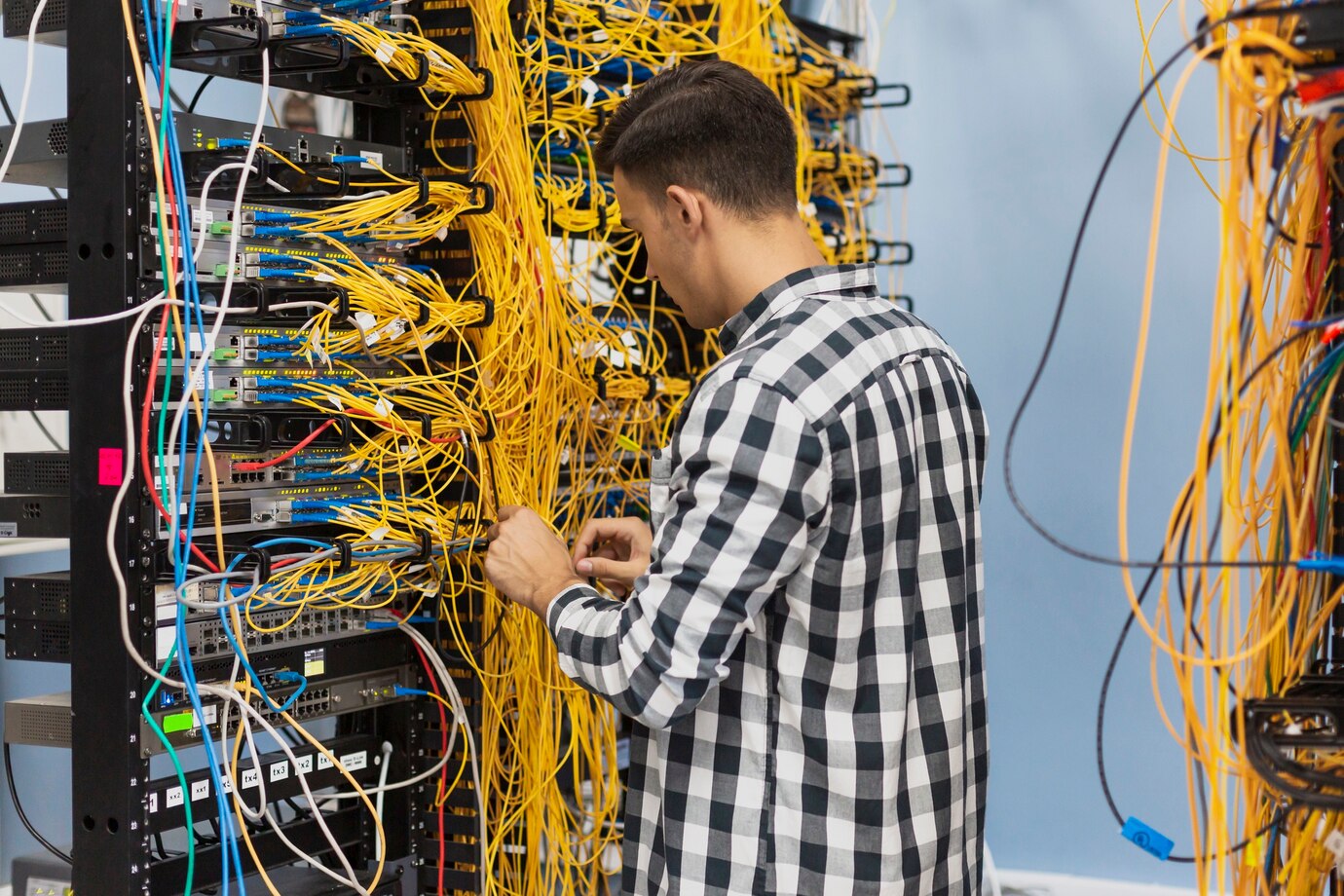IT Network management is defined as keeping a business network safe and healthy, including monitoring, maintenance, and regular updates.
To control an IT network management, admins use their skillsets, processes, and tools to ensure network resources are provided for users and services efficiently and securely; these resources include hardware, storage, bandwidth, data, and processing power among others. Providing IT services in NYC has been an integral part of our business.
In this blog, we will discuss IT network management and how the network works. So, without further ado, let’s get started.
Network maintenance helps equip, monitor, secure, and operate an organization’s data transfer channels. For example, IT personnel in an organization can prioritize access to core applications regarding processing power and memory resources as opposed to other less important apps, illustrating why to use managed services for optimal network performance and efficiency.
It’s impossible for any business to operate effectively today without an IT network management strategy, especially when setting up a small business network, because of the adoption of new techs, migration of data to the cloud, and use of IoT solutions in manufacturing.
Though IT networks play an essential role in business operations, communications, and collaborations, proper IT network management enables an organization to operate smoothly, compete successfully, and innovate.
What Are the Main Motives for Network Management?
Understanding the four main aspects of network management is essential for building a thorough solution for your IT network management.
- Administration
- Maintenance
- Provisioning
- Security
Let us explore each section in depth:
Administration
Network administration is the central nervous system for IT network management. It encompasses planning, designing, and implementing the strategy, ensuring smooth network operation. It includes creating rules that control network access, usage, and security.
Complexity requirements for passwords are specified by administrators, acceptable use policies are set up, and data security protocols are established. Additionally, they equip network devices such as routers, switches, firewalls to allow right communication and functionality in the network.
Additionally, the network administrator manages the user and device accounts, assigns permissions and access levels to the users, and ensures that the proper device is registered.
Finally, network administrators play an essential role in monitoring and troubleshooting the performance of a network. They monitor the network health, identify and resolve potential issues, and work toward optimization.
Maintenance
Network maintenance is the core of the ongoing care and upkeep required to maintain a robust network infrastructure. This involves regular activities such as installing software patches, firmware updates, and fixing devices’ security.
Network maintenance also includes physical maintenance of network components such as cables. This security measure ensures the proper functioning of the physical infrastructure via cleaning, testing, and replacing age-old equipment when required, thereby avoiding cabling mess.
Provisioning
Network provision aims to prepare and allocate resources for new devices. This process of assessing present network use and predicting future requirements is to ensure that adequate resources exist to meet any new extensions. This also includes making the necessary configurations on new gadgets, such as a small business server, so they can link up with the networks. This might include pre-configuring settings and ensuring compatibility with the existing infrastructure.
Additionally, network provisioning involves generating user accounts with accurate access levels based on user roles and needs. Security configuration is also an essential aspect of network provisioning.
Security
Network security is an evolving phenomenon that defends the network against data breaches, unauthorized access, and malicious attacks by doing such things as implementing firewalls, access control lists (ACLs), and user authentication to restrict access to resources. Tackling vulnerabilities is crucial for network administrators, which is why network security is important.
They regularly scan devices, software, and configurations for vulnerabilities. The found weaknesses are then fixed to strengthen the defenses.
What is Network System Management?
Network System Management serves as an interface for network engineers allowing them to manage isolated elements of a network within a broader context of network management that offers numerous important functions. With a reliable and a convenient IT support nyc you can secure your network safely and can help improve the performance of the network.
What Does it Mean to Maintain a Network?
Network maintenance means ensuring that certain measure sre taken to make certain that your network is running, and this involves different tasks such as troubleshoot network issues, install hardware and software and monitoring network performance.
Network Management Best Practices
Below mentioned are the best network management practices:
- Identify Critical Infrastructure and Systems: Critical systems and devices will always exist in an organization. For example, the email server is one of the best and most essential network infrastructure in an office environment. If this goes downhill, productivity suffers.
- Understand and Implement Security Best Practices: Understanding network defenses and carrying out security best practices is one of the most common habits. It is a set of policies and strategies for network health monitoring, detection of weak points and prevention of unauthorized entry that make up network security functions.
- Monitor the Network: Monitoring is important when you need a network to keep working well. It is essential that a network manager can figure out which actions are typical for multiple users and devices, based on data they have access to within a short time. In addition, monitoring helps ensure that critical systems are highly available, eliminating the need for multiple-point solutions.
Network Management Issues
Some of the most common network management issues are mentioned below:
- Network Congestion: These are Caused due to excessive data traffic overloading the network.
- Hardware Failures: These are caused by malfunctioning network hardware such as routers or switches.
- Configuration Issues: These are caused by incorrect network device settings.
- Compatibility Issues: Incompatibility between different network devices.
Conclusion
Though many factors are involved in IT network management, it is essential that the organization establish a proper strategy that minimizes downtime and supports daily workflows and operations. Without a reliable network, modern businesses will struggle to win and maintain market share, face costly downtime, and even generate unnecessary security flaws. Partnering up with a managed IT services provider will ensure that the businesses have a reliable network, which is crucial for maintaining their networks, avoiding costly downtime, and preventing unnecessary security flaws.





